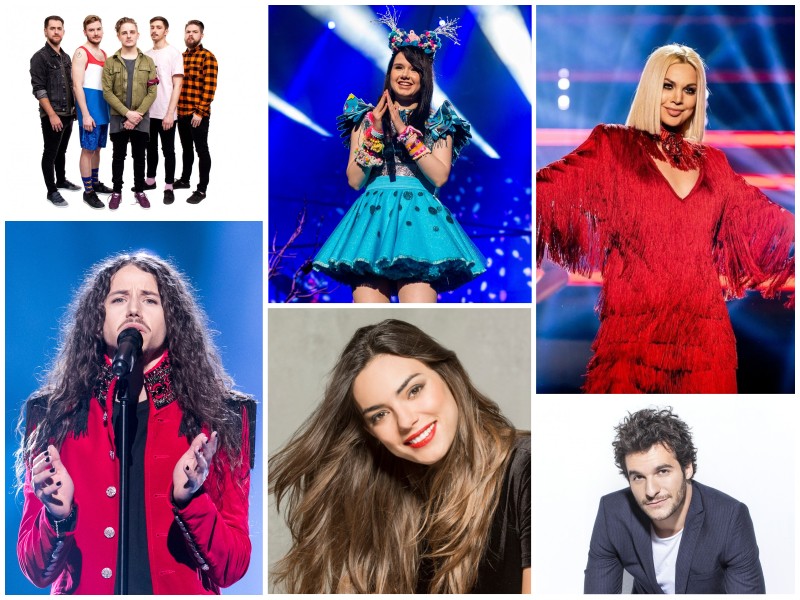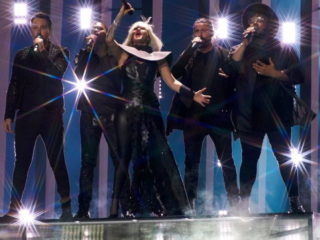Today is September 1st, a date considered by many fans as “Eurovision New Year’s Day”. It’s the date from which potential entries for Eurovision 2021 can be made public without penalty — and with it comes the thrilling notion that any song released from this point on could be a Eurovision entry.
It doesn’t usually happen like that, though. Most broadcasters keep their national final entries or internal selections under lock and key until the time is right. It’s less common that broadcasters select their Eurovision entries from songs that have already been released. But it does happen occasionally. Let’s look at some recent Eurovision entries that were released as singles before being confirmed for Eurovision.
1. Samanta Tīna – “Still Breathing” (Latvia 2020)
When Samanta Tīna released her single “Still Breathing” in November 2019, fans noticed it was under the three-minute time limit and that the song was co-written by Latvia’s Eurovision queen Aminata. So it was no surprise when Samanta Tīna was among the shortlisted acts for Supernova 2020 and was eventually selected for the grand final. “Still Breathing” went on to win Supernova, but sadly never made it to Eurovision 2020 due to the contest’s cancellation.
2. Alekseev – “Forever” (Belarus 2018)
In November 2017, Alekseev released his single “Навсегда” (“Navsegda”). After originally considering entering the Ukraine national final, Alekseev decided to try his luck with Belarus, where he entered an English version of the song, titled “Forever”. The song needed to be edited down to a Eurovision-friendly length, but notoriously “Forever” went through multiple revamps before the final Eurovision version was decided on. Despite all the effort, “Forever” only placed 16th in its semi-final.
3. Tulia – “Fire of Love (Pali się)” (Poland 2019)
With their unusual combination of garage rock meets white voice singing, Tulia released their single Pali się in November 2018. They were confirmed as being Poland’s act for Eurovision in February 2019. One month later, it was confirmed that they would take the song to “Fire of Love (Pali się)” to Tel Aviv. As well as the new title, it had a few English lyrics thrown in to help convey the message of the fire of love. Tulia narrowly missed out on the grand final, being only two points away from a tenth-place qualification.
4. Jamie-Lee – “Ghost” (Germany 2016)
“Ghost” was the winner’s single for Jamie-Lee after her The Voice of Germany victory and was released in December 2015. One month later it was confirmed as a competing entry in Germany’s hastily organised national final. After winning the national final, the near four-minute song was edited down to a shorter version. Unfortunately “Ghost” placed last in the Eurovision grand final, earning only 11 points.
5. AWS – “Viszlát nyár” (Hungary 2018)
Like a lot of entries in Hungary’s A Dal, post-hardcore band AWS released their song well before being confirmed as a participant in the national final. “Viszlát nyár” was released in October 2017 and was confirmed as an A Dal entry in early December. The Eurovision version of the song was edited down to the allowed length, but the overall sound was kept much the same. AWS made it to the grand final in Lisbon where they placed 21st.
6. Voltaj – “De la capăt (All Over Again)” (Romania 2015)
Voltaj’s moving rock ballad was originally released in November 2014 as “De la capăt”. Three months later, it was confirmed as one of the competing acts in Romania’s Selectia Nationala, and it went on to win the national final. For Eurovision, the song was edited to meet the time limit and given an English chorus to help emphasise the song’s message. “De la capăt” placed 15th in the grand final.
7. Donatan & Cleo – “My Słowianie – We Are Slavic” (Poland 2014)
Polish producer Donatan and X Factor singer Cleo released “My Słowianie” in early November 2013. Rumours swirled that TVP was considering it for Eurovision, and eventually the saucy song was confirmed as Poland’s comeback entry in February 2014. The song had to be edited down to meet the Eurovision time limit and was also given some English lyrics. Cleo and her Slavic girls placed 14th in the grand final — one of Poland’s best results.
7. Alma – “Requiem” (France 2017)
Alma’s single was released in mid-January 2017, and in early February the song was confirmed as France’s entry for Eurovision that year. The song was later given a revamp, which included an English chorus intended to broaden the appeal of the song. “Requiem” went on to place 12th in the grand final.
9. Zoë – “Loin d’ici” (Austria 2016)
Austrian singer Zoë had originally released “Loin d’ici” in October 2015, as a track on her debut album Debut. Three months later the track was confirmed as one of the competing entries in the Austrian national final. By the time Zoë competed in Wer singt für Österreich, the four-minute-plus track had been edited down to under three minutes and given a revamp. The fan favourite placed 13th in the grand final.
10. Michał Szpak – “Color of Your Life” (Poland 2016)
“Color of Your Life” was originally released in mid-November 2015, as a track on Michał Szpak’s album Byle być sobą. In February 2016, it was confirmed as one of the competing songs in Krajowe Eliminacje. After the song won the national final, it had minor edits to bring it under the three-minute time limit. “Colour of Your Life” placed eighth in the grand final and is Poland’s third-best ever result.
11. Amir – “J’ai cherché” (France 2016)
Amir released his second single “J’ai cherché” in mid-January 2016. Two weeks later, broadcaster France 2 confirmed that the song has been internally selected as France’s entry for Eurovision 2016. As the single version of the song was well over three minutes, it was edited down (and given a slight revamp) for Eurovision. “J’ai cherché” placed sixth in the grand final and kicked off the new French Eurovision renaissance.
12. Mikolas Josef – “Lie to Me” (Czech Republic 2018)
Mikolas Josef’s cheeky tune “Lie to Me” was released in November 2017 and grabbed the attention of Eurovision fans who thought it would be a perfect entry for the Czech Republic. In January, the song was confirmed as one of the competing acts in the national final. It went on to win the ticket to Lisbon but first needed some lyrical changes to meet the family-friendly Eurovision rules. “Lie to Me” placed sixth in the grand final, the Czech Republic’s best ever result.
What do you think? What other Eurovision entries were singles first? Should songs be released in the wild before getting confirmed for Eurovision? Share your thoughts below!











In case of France, songs were both for 2016 and 2017 released in january but they were already set to participate to Eurovision before their release. Edoardo Grassi (our ex-HoD) said that he wanted to song to be played on radios before being announced as the song to represent us.
Alma even performed Requiem in august 2016, if I recall correctly.
Nice article again from Robyn. The Jamie Lee and Akexseev stories were especially interesting
i remember listening to pali sie after tulia was announced and i thought that it could be a good entry for to perform at the eurovision before they chose that song, first time that happened to me as a eurofan
In a way selecting an already released track as an entry is a bit unfair since you already know it will do well. You don’t have to risk anything..
I agree 100%.
This is meaningfull in case of internal selection (France 2016) and about national selections, I think the “aura” they create in their respective countries are enough to grab people and fan’s attention with snippets or forms of teasers for example. I can’t see a song not taking benefit from being released early because it let people to accomodate with it, on radios, medias and even more nowadays on platforms and social networks that can easily propulse at the scale of phenomenon any particular song.
If France comes back internal again (which I hope won’t happen in years to come), they should stay in what they did in both 2016 and 2017 : shortlist some ARTISTS first, then collab with actual and recognized FRENCH songwriters, and then publish the songs, to let expectations high and “familiarize” the public with it BEFORE finally confirme that this song that is now growing on radio and medias will finally represent the country at Eurovision.
So this means you prefer a national final for France? Makes sense
Yes of course, the public is definitely something decisive to attract people’s interest. And no matter what, the artist and song is set to REPRESENT a country, a culture and the people who shape it above all!! So even if something that has been chosen by locals can look like wrong for fans from outside, the fact that the people in the country are confident with what they chose and think this is what they want to show, to make pass to the rest of Europe/World is the most important thing after all.
And France’s (my country) new “way” for 2021 suggests it very well, with the selection moving into a regional city, to gather people from everywhere of the country around a such a musical event as it’s already the case for several etablished shows on FTV like “La Fête de la musique” which takes place annualy. According to all of the elements, I think this new selection is starting for at least more than one edition and will continue in the near future, because there is still an interest and an audience to catch around Eurovision in the country, that’s why… Read more »